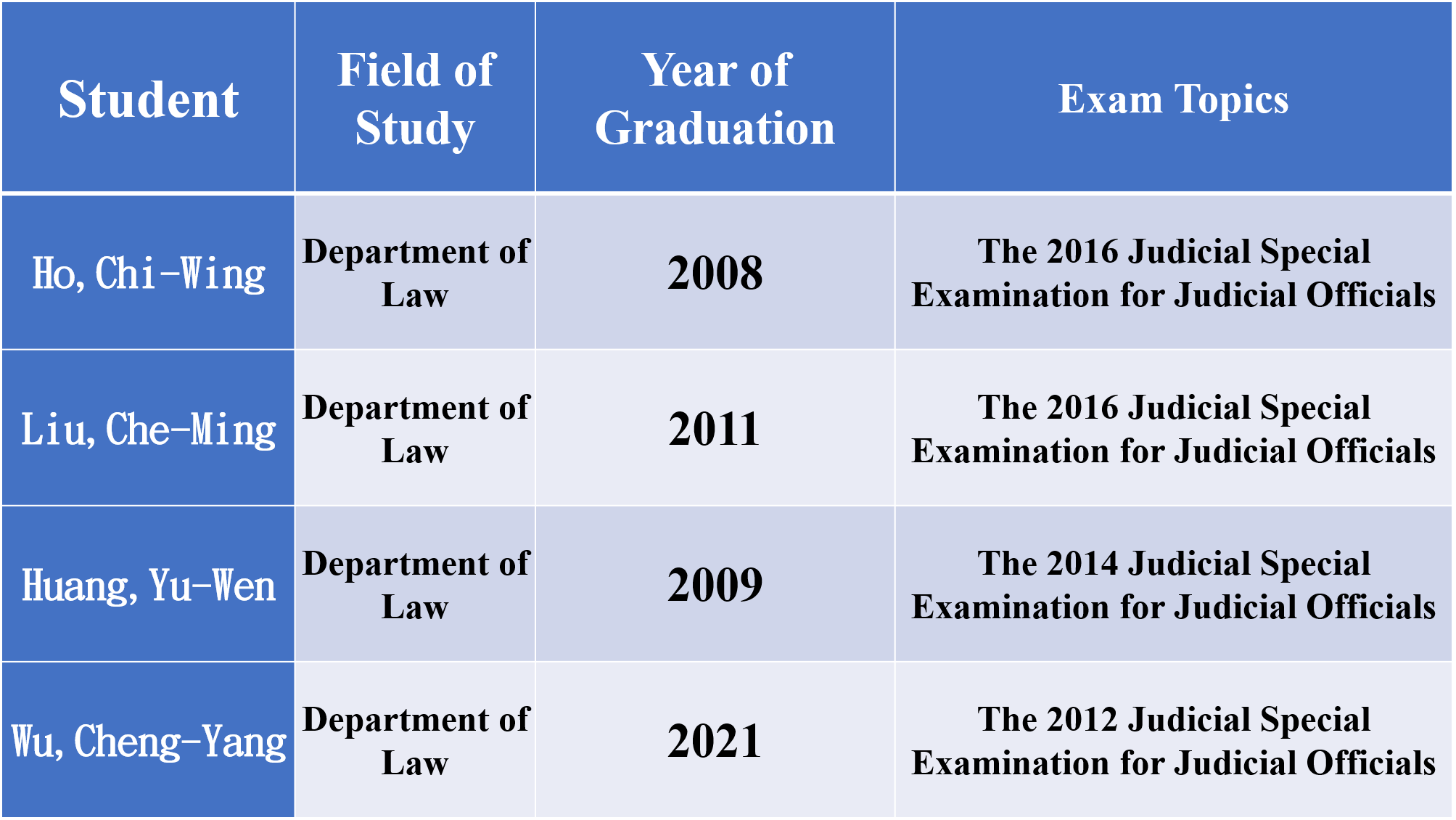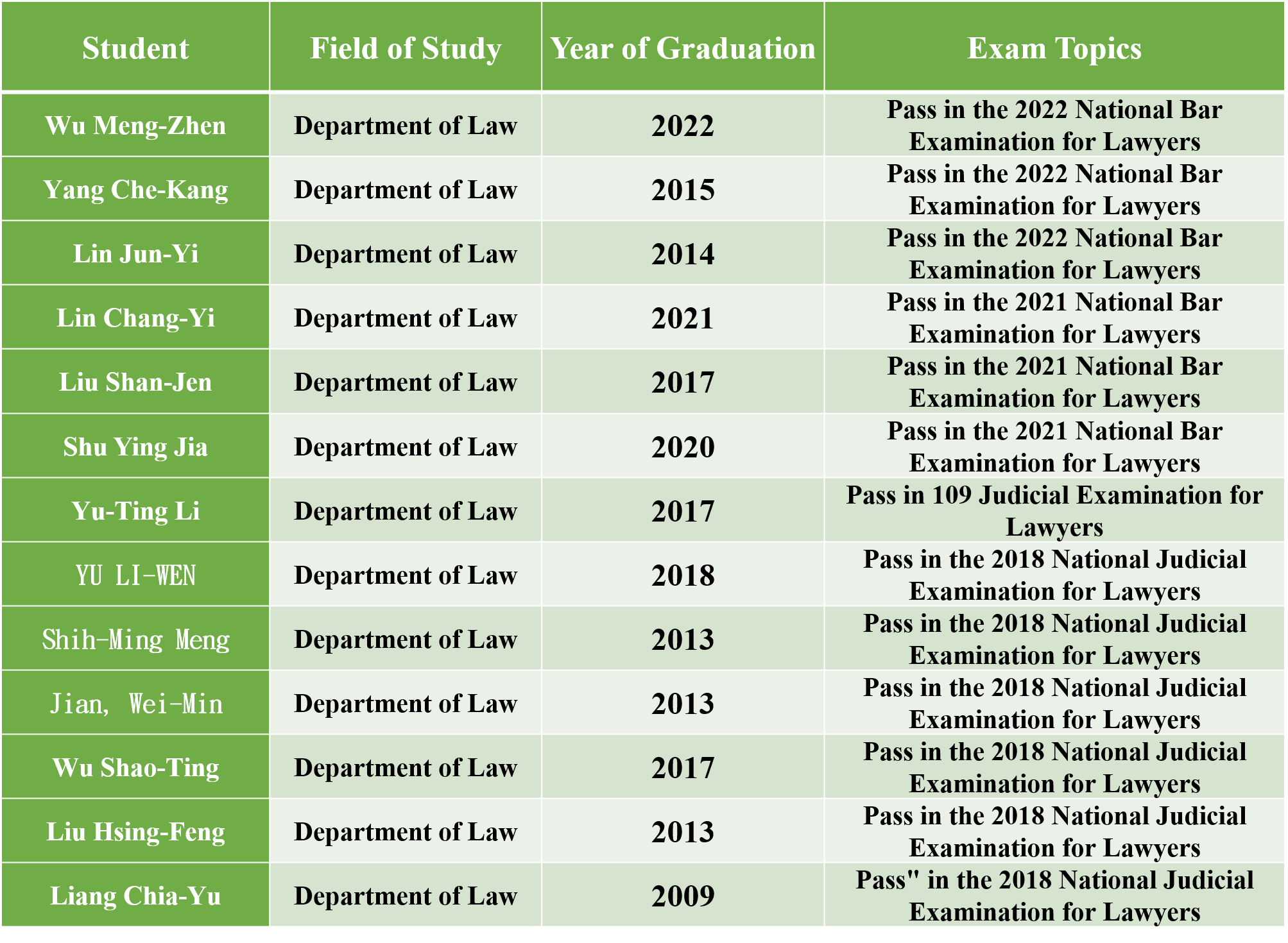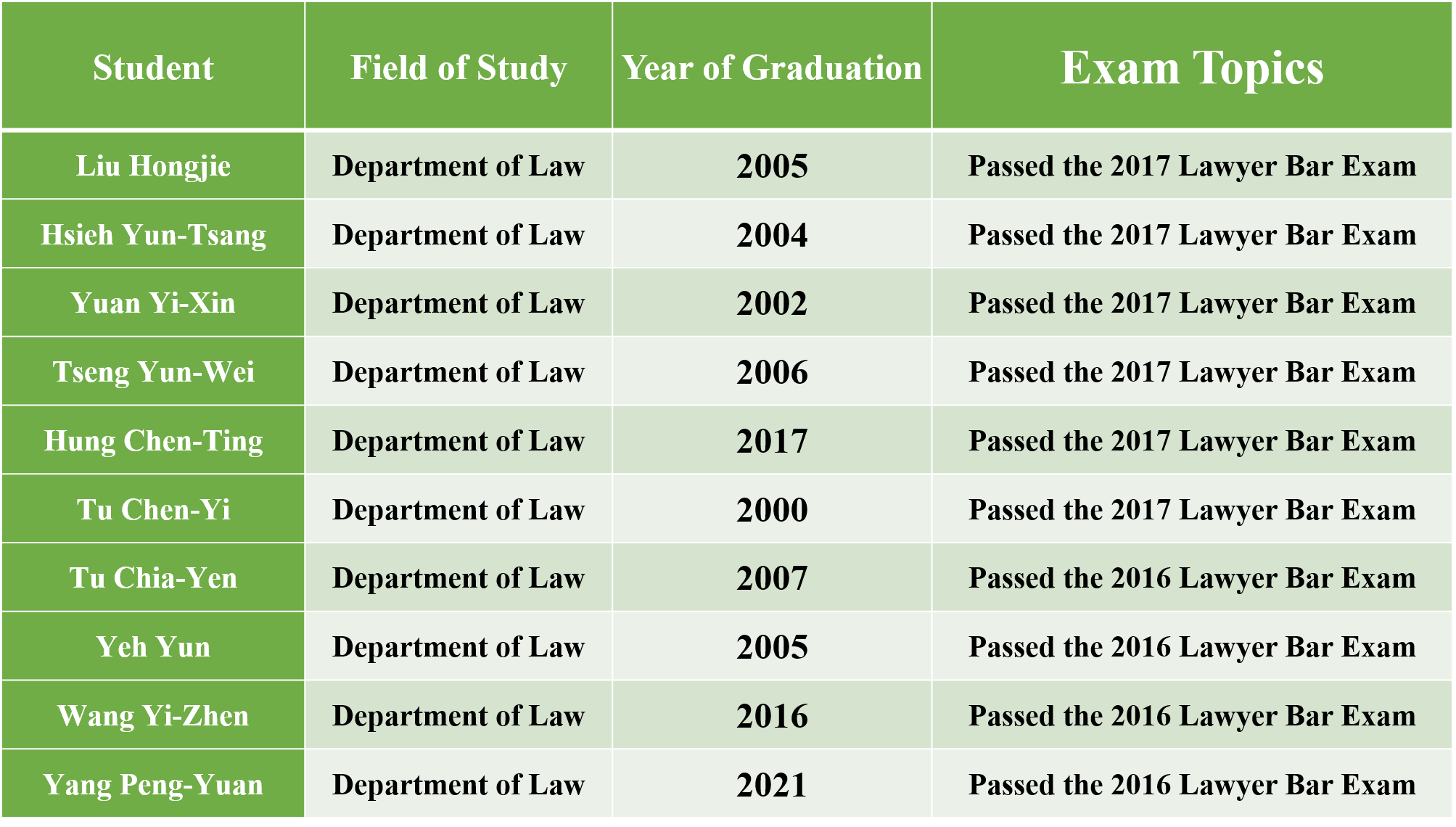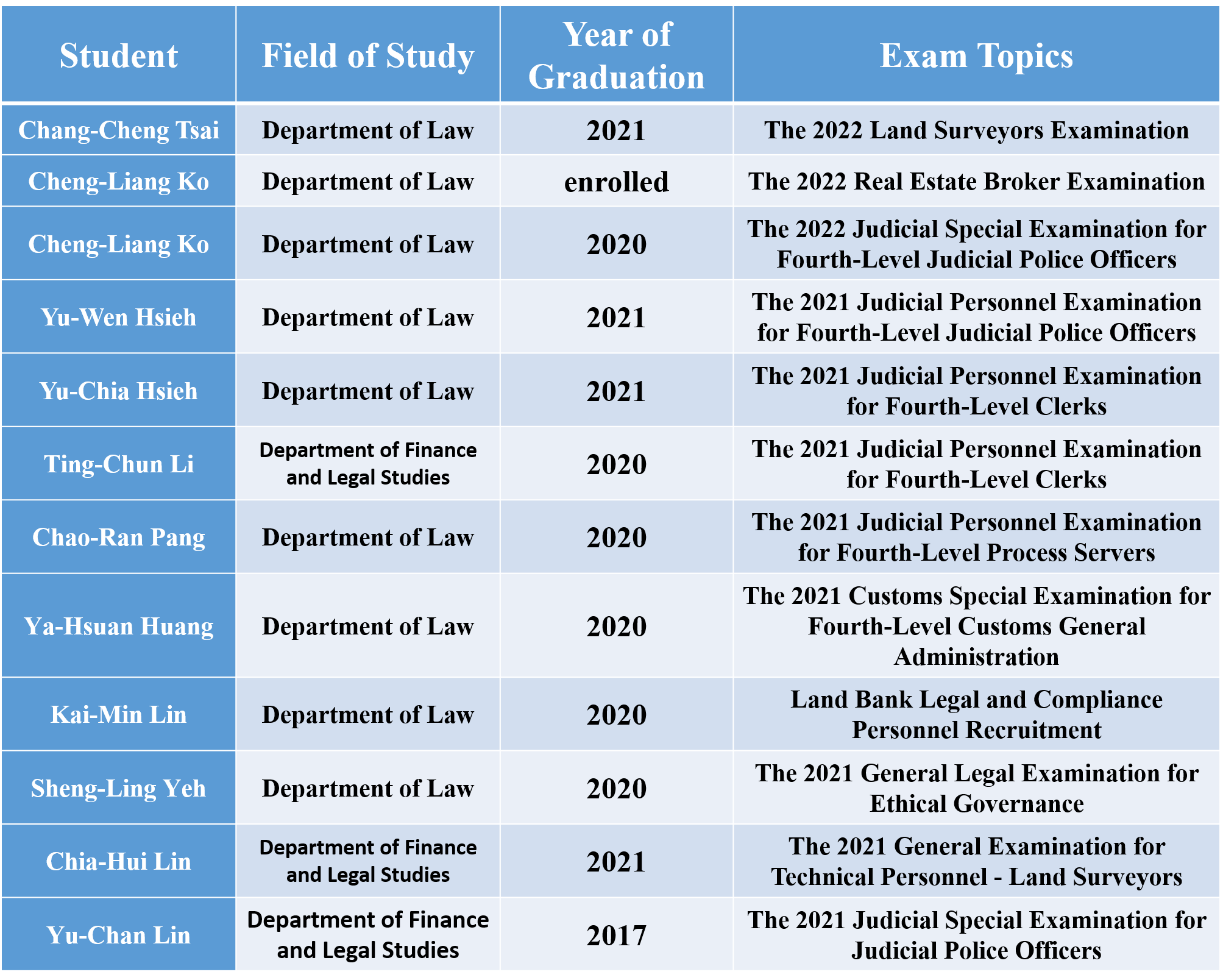High School Student Zone
Words from the Department Head
"The Department of Law was established in 1992 and began to enroll undergraduate students the following year. Starting with one class per grade level, the department gradually expanded and increased to three classes. In 1999, the Master's program in Law was established to meet the rapidly developing needs of society. In 2005, the department was divided into three departments, including the Department of Law, the Department of Finance and Law, and the Department of Science and Technology Law. Since the 2011 academic year, the department has restructured its undergraduate program to meet the needs of contemporary society, offering two separate degree programs: the Department of Law and the Department of Finance and Law. The graduate program currently accepts 18 students each year, mainly from students who have graduated from law or related disciplines such as finance and law, political law, and science and technology law. The Master's program in Law was established in 1999 and also accepts 18 graduate students each year, mainly from students who have graduated from law or related disciplines such as finance and law, political law, finance and law, and science and technology law. In 2014, the Master's program in Law for in-service professionals was established, accepting individuals from non-law backgrounds who wish to pursue further studies. The educational mission of the department is to focus on student guidance, cultivate legal professionals with core abilities, solid legal theory foundation, practical knowledge, responsibility, noble character, basic foreign language abilities, information capabilities, and humanistic literacy to contribute to society and the nation. The department's curriculum design emphasizes diversity, particularly emphasizing language, information, and integrated analytical training. Additionally, the department focuses on combining legal theory with practical skills, encouraging student participation in community legal services and legal education advocacy. In the 107 academic year, the department offers 17 admission spots for students recommended by the "Star Program" and 63 spots for individual applications. Please refer to the school's admission brochure for more information. We welcome students with an interest in law to apply.
[ Admission Information(link is external)] [School's High School Student Section]
Introduction to the Department
The Department of Law was established with approval in 1992 and began recruiting undergraduate students the following year. It started with one class per year and gradually grew to three classes. In 1988, the Master's Program in Law was established in response to the rapid development of society. In 2005, the department was restructured into three separate departments: the Department of Law, the Department of Financial and Economic Law, and the Department of Science and Technology Law. However, starting from the academic year 2011, the Department of Law and the Department of Financial and Economic Law became the only two departments recruiting undergraduate students, and the freshman and sophomore non-department system was eliminated. The Department of Law's graduate program currently admits 18 students per year, with the majority coming from undergraduate programs in law or related fields such as financial and economic law, political law, or science and technology law. In addition, the department has a Master's Program in Law that admits 18 graduate students per year, and a Master's Program in Law for Working Professionals, which was approved in 2014 and is designed for non-law graduates who are interested in pursuing legal studies.
The educational goal of the department is to cultivate legal professionals who possess core competencies, solid foundations in legal theory, practical knowledge, a sense of responsibility, noble character, basic language abilities, information technology capabilities, and humanistic qualities. The department's curriculum is designed to be diverse and emphasizes training in language, information, and integration analysis. Additionally, the department encourages students to participate in community legal services and legal education promotion. For the academic year 2018, the department offers 17 places in the Star Program and 63 places in the individual application program. Please refer to the university's admission brochure for more details. We welcome students who are interested in legal studies to apply.
Admission for university personal applications - evaluation items and assessment criteria:
Outstanding alumni
The National Examination Honor Roll:
Since the first graduating class of the undergraduate department in 1997, the number of outstanding alumni who have passed the judicial special examination and the lawyer qualification examination has accumulated to more than 100 people. In the 107th year of the judicial examination announcement, the performance of Ming Chuan law professionals was outstanding, with a total of 16 people nominated for the list of successful candidates in domestic and foreign judicial examinations, including 4 recent graduates. We hope that Ming Chuan law professionals can maintain their strong performance in examinations and pass on the tradition to the next generation. Ming Chuan law professionals have gained an excellent reputation in the field of judicial practice and have created a gold-lettered signboard for Ming Chuan law professionals.
Judicial Officials Examination.

Bar Examination


National Examination

Q&A
Q: What do you learn in a law school?
A: To prepare students for the judicial exam (judges and lawyers), the curriculum of the law school includes the following courses: In the first two years, students take foundational legal courses such as the Constitution of the Republic of China, General Principles of Criminal Law, General Principles of Civil Law, General Principles of Civil Code, Property Law, Family Law, Inheritance Law, Specific Offenses in Criminal Law, and Administrative Law. In the third and fourth years, students take specialized courses such as Corporate Law, Insurance Law, Specific Provisions of Civil Code, Civil Procedure Law, Criminal Procedure Law, Negotiable Instruments Law, and Legal English.
In addition, to accommodate students' interests, the law school also offers a variety of elective courses, including courses on Court Organization Law, Introduction to Mainland Chinese Law, Labor Law, Land Regulations, International Public Law, Maritime Law, Civil Case Studies, Criminal Case Studies, Securities Trading Law, Social Security Law, Juvenile Justice Law, Private International Law, Criminology, Jurisprudence, Legal Documents, and Legal Practice. A "Technology and Law Credit Program" is also available for students interested in intellectual property law, which includes courses such as Patent Law, Trademark Law, Copyright Law, Cybersecurity Law, and E-commerce Law.
